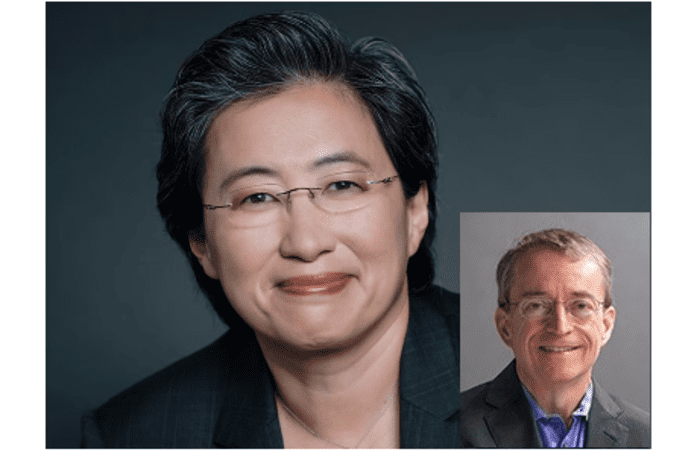Intel CEO Gelsinger’s total 2023 compensation rose 45% from 2022, as the stock soared 90%

AMD CEO Lisa Su’s 2023 compensation was 80% higher than Intel CEO Pat Gelsinger’s payout.
Intel Corp. Chief Executive Pat Gelsinger got a big bump in compensation in 2023, but it still amounted to just over half what Lisa Su made as CEO of rival Advanced Micro Devices Inc.
In Intel’s 2024 proxy statement filed Thursday, it was disclosed that Gelsinger had total compensation of $16.86 million in 2023, or 45% more than his total 2022 compensation of $11.61 million.
As a point of reference, Intel’s stock INTC, -2.07% soared 90.1% in 2023 after tumbling 48.7% in 2022. In comparison, the S&P 500 index SPX gained 24.2% in 2023 after falling 19.4% in 2022.
AMD’s stock AMD, -4.07% shot up 127.6% in 2023, after slumping by 55% in 2022.
Broken down, Gelsinger’s 2023 salary fell 18% to $1.07 million, from $1.3 million in 2022, but the value of the stock awards he received increased to $12.43 million from $8.87 million, while his non-equity incentive plan compensation, which includes cash performance bonuses, jumped to $2.89 million from $945,900.
He also received $112,000 in deferred compensation, to reflect changes in the value of his pension, which he didn’t receive last year.
The “all other compensation” category dropped to $362,900 from $497,100. In 2023, that category included $16,500 in retirement-plan contributions, $84,200 in deferred compensation plan contributions, $27,500 for financial planning and physicals and $227,200 for company-provided car service.
Regarding the car service, the amount reported represents the cost of the service used for “nonbusiness” purposes.
“We do not consider these additional security measures to be a personal benefit for our CEO, but rather appropriate expenses for the benefit of Intel that arise out of our CEO’s employment responsibilities and that are necessary to his job performance as well as his safety,” Intel said.
There was also $7,500 in “other” compensation, which included $1,500 for residential security and $6,000 in charitable contributions made on Gelsinger’s behalf.
Meanwhile, AMD’s proxy statement released earlier this week put Su’s total 2023 compensation at $30.35 million, or barely above her 2022 compensation of $30.22 million — but still 80% more than what Gelsinger made.
Su’s salary last year was $1.2 million, and she had $21.85 million in stock awards, $5.84 million in option awards, $1.43 million in non-equity incentive plan compensation and $28,711 in all other compensation.
Su’s all other compensation included contributions of $14,850 to her 401(k), $2.412 in life-insurance premiums paid, and “other” compensation of $11,449, which was the cost of “spousal travel on company aircraft” for business trips.
Don’t cry for Gelsinger, however. Remember that in 2021, after he returned to Intel as CEO on Feb. 15, he reaped total compensation of $178.59 million. That included “new-hire equity awards of a significant magnitude” — $140.43 million to be exact — so the company could hire “the best leader possible.”
From the time Gelsinger became CEO through Thursday’s close, Intel’s stock has tumbled 28.5%, while AMD shares have charged up 92.5%.
And what of Jensen Huang, the CEO of Nvidia Corp. NVDA, -1.15%, the rival chip maker and current hottest artificial-intelligence play?
Nvidia hasn’t filed its proxy statement for its latest fiscal year, which ended Jan. 28. But for the fiscal year that ended Jan. 29, 2023, Huang’s total compensation was $21.36 million, down from $23.74 million the year before.
What will his compensation for the latest fiscal year be, after the stock rocketed by 238.9% in 2023?
Nvidia’s stock is up by 503.9% from Feb. 15, 2021, through Thursday, and its market capitalization as of Thursday’s close was $2.26 trillion, which was 4.7 times the combined market cap of Intel, at $186.75 billion, and AMD, at $291.63 billion.

